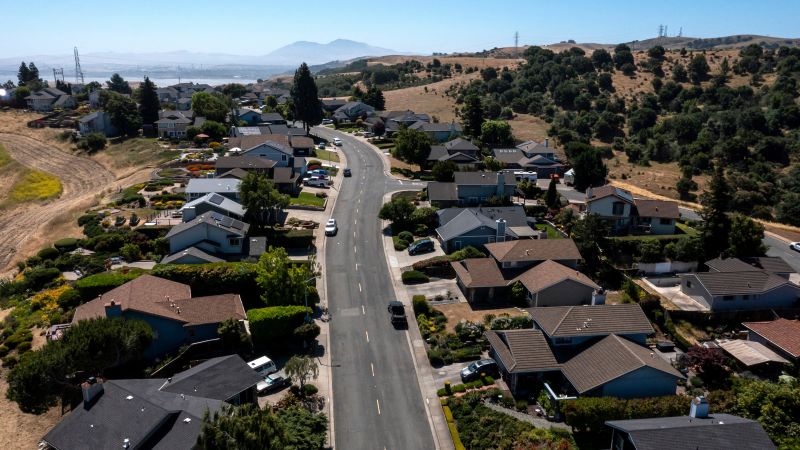After the last few years of skyrocketing home prices and elevated mortgage rates, Americans have been feeling overwhelmingly dejected about their prospects of buying a home. But there are now signs that maybe, just maybe, the worst could be over for homebuyers.
“June, in particular, has started to show the housing market slowing down in favor of buyers,” said Skylar Olsen, Zillow’s chief economist.
During the pandemic, families and remote workers rushed to find homes offering extra space, taking advantage of historically low borrowing costs after the Federal Reserve slashed interest rates to support the US economy. While the Fed doesn’t directly set mortgage rates, its actions do influence borrowing costs throughout the economy.
When the Fed began aggressively hiking rates again in March 2022 to battle historically high inflation, most economists expected housing demand to take a hit. High interest rates tend to decrease demand for homes, driving down prices.
But something else happened. Demand for homes didn’t disappear; instead, more homeowners held off on listing their homes to keep their pandemic-era ultra-low mortgage rates. This, coupled with an existing housing shortage, caused home prices to surge even higher.
For the past two years, potential homebuyers have faced a double whammy of high prices and high mortgage rates.
But a recent report from real estate marketplace Zillow found that nearly one in four home sellers offered price cuts in June. That’s the highest level for that month since 2018.
Also, the average rate for a 30-year fixed-rate mortgage fell this week to its lowest level since mid-March.
This, along with a jump in new home construction and the expectation the Federal Reserve could begin cutting interest rates in September, could make buying a home more affordable in the future.
Things may soon start looking up for Americans interested in buying a new home, said Rick Sharga, founder of real estate consulting firm CJ Patrick Company.
“We’re sitting today at probably, if not the worst affordability ever, really close to the worst affordability ever — so we almost have nowhere to go but up,” Sharga said. “I do believe we’re past the worst.”
In another promising indicator for homebuyers, home price appreciation is slowing, according to Zillow’s June Market report. Annual appreciation was 3.2% in June and monthly growth decelerated to 0.6%, the slowest June price appreciation since 2011.
While still below pre-pandemic levels, home inventory is piling up. According to the report, there were 23% more active listings in June compared to June of 2023.
Potential homebuyers now may not feel as much pressure to make a snap decision. Homes in June sat on the market for an average of 15 days. While that is still shorter than pre-pandemic, it is four days longer than last year.
“There’s a bit more breathing room,” Olsen said. “That’s still a sign of a housing market that we classify as a sellers’ market, but we’re on the cusp of going neutral.”
A growing number of Wall Street investors — more than 90%, according to the CME FedWatch tool — are forecasting the Federal Reserve will begin cutting interest rates in September. That could translate to more relief from high monthly mortgage payments down the line.
Lower mortgage rates could also, crucially, free up housing inventory, Sharga said.
“It will likely entice some homeowners to list their properties and move on, which they haven’t been doing with rates as high as they are,” he said.
Another major factor: Home construction is flourishing. Normally, higher borrowing costs make it more expensive to build, but according to US Census data, construction of new homes rose 3% in June, while the number of new, privately owned homes that completed construction jumped more than 10% in one month and 15.5% since June of last year.
It may take some time before homebuyers feel any improvement in their market, and since real estate is local, each area in the country tells a different story. For example, New Orleans is one city that has already tipped into becoming a buyers’ market, according to Zillow data. While that may sound like great news for people looking to buy homes in the area, Leslie Heindel, a Realtor in New Orleans, said lower home prices in the city mask other costs.
“When the pandemic started, everything went crazy. Something would hit the market and you would have 20 offers in one day,” she said. “And then insurance changed here and that was it for us.”
Heindel said that homeowners’ insurance rates have shot up for many people in the area, creating an additional, and often unexpected, cost of owning a home.
“For people to be able to buy a house, we couldn’t continue selling at inflated prices along with higher interest rates and the insurance situation,” she said. “You can definitely get something cheaper here now, but there’s a reason for it.”
Read the full article here
